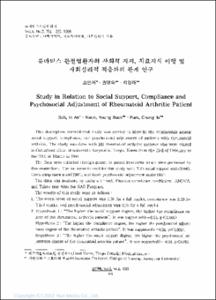류마티스 관절염환자의 사회적 지지, 치료지시 이행 및 사회심리적 적응과의 관계 연구
- Keimyung Author(s)
- Kwon, Young Sook; Park, Cheong Ja
- Department
- Dept. of Nursing (간호학)
- Journal Title
- 류마티스건강학회지
- Issued Date
- 1999
- Volume
- 6
- Issue
- 2
- Keyword
- Social support; Compliance; Psychosocial adjustment
- Abstract
- This descriptive correlational study was carried to identify the relationship among social support, compliance, and psychosocial adjustment of patients with rheumatoid arthritis. The study was done with 100 rheumatoid arthritic patients who were visited in Outpatient clinic of university hospital in Taegu, Korea from the 23rd of February to the 20th of March in 1998.
The Data were collected through person to person interviews which were performed by five researchers. The irstruments used for this study were Yu's social support scale(1996), Cho's compliance scale(1987), and Kim's psychosocial adjustment scale (1997).
The data was analyzed by using a t-test, Pearson correlation coefficient, ANOVA, and Tukey test with the SAS Program.
The results of this study were as follows ;
1. The mean score of social support was 2.76 for 4 full marks, compliance was 3.20 for 5 full marks, and psychosocial adjustment was 2.26 for 4 full marks.
2. Hypothesis 1 : "The higher the social support degree, the higher the compliance degree of the rheumatoid arthritis patient". It was supported(r=0.54, p<0.001).
Hypothesis 2 : "The higher the compliance degree, the higher the psychosocial adjustment degree of the rheumatoid arthritis patient". It was supported(r=0.34 p<0.001).
Hypothesis 3: "The higher the social support degree, the higher the psychosocial adjustment degree of the rheumatoid arthritis patient". It was supported(r=0.24, p<0.05).
3. In general, the spouse group compared to other groups was demonstrated as the most dependable group for patients to trust and expect support. And the sons and daughters group was shown higher than other groups in terms of social support(F=4.19, p=0.01). There was no difference in terms of compliance in degree. In the degree of psychosocial adjustment the highly educated group(more than high school) is a little higher than the lowly educated group(F=3.08, p=0.03). In the costs of medical care, the group that could afford was significant higher than the group which could not afford results in terms of the psychosocial adjustment degree(F=3.99, p=0.01).
The outcome of this study is that the social support that related rheumatoid arthritic patients had an effect on the following compliance, and the following compliance helps psychosocial adjustment of patients. It also shows that social support related psychosocial adjustment. Therefore, to increase the level of psychosocial adjustment of rheumatoid arthritic patients, it will he effective in supportive nursing intervention to improve social support and compliance.
- Alternative Title
- Study in Relation to Social Support, Compliance and Psychosocial Adjustment of Rheumatoid Arthritic Patient
- Publisher
- College of Nursing
- Citation
- 소인애 et al. (1999). 류마티스 관절염환자의 사회적 지지, 치료지시 이행 및 사회심리적 적응과의 관계 연구. 류마티스건강학회지, 6(2), 211–225.
- Type
- Article
- ISSN
- 1225-9020
- Appears in Collections:
- 2. College of Nursing (간호대학) > Dept. of Nursing (간호학)
- 파일 목록
-
-
Download
 oak-bbb-4304.pdf
기타 데이터 / 920.08 kB / Adobe PDF
oak-bbb-4304.pdf
기타 데이터 / 920.08 kB / Adobe PDF
-
Items in Repository are protected by copyright, with all rights reserved, unless otherwise indicated.